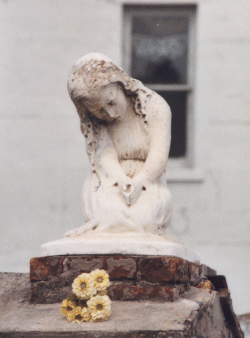 All Saints Day has always
been a special day in New Orleans. It's a day observed by families going to the graveyards.
All Saints Day has always
been a special day in New Orleans. It's a day observed by families going to the graveyards.ALL SAINTS DAY
A NEW ORLEANS TRADITION
By Shirley Augusta
[Shirley Scott Augusta is the grandaughter of Oscar Braud (or Breaux), who was a first cousin of Leontine Braud Allen.]
 All Saints Day has always
been a special day in New Orleans. It's a day observed by families going to the graveyards.
All Saints Day has always
been a special day in New Orleans. It's a day observed by families going to the graveyards.
They clean and witewash the graves, plant flowers, and do whatever's necessary for the upkeep of the graves. My family would walk about two miles up to the Soniat St. Vincent Cemetary on November 1, All Saints Day. We would take a lunch and make a day of it by cleaning off the family grave and put fresh flowers in a vase on the grave. Crysanthemums, either yellow or white, were really the flowers used.
Many people didn't put crysanthemums in their homes, because it was associated with being used on the graves. I suppose it's just a superstition associated with death. I don't have a fear of death, because from a small child to an adult going to the cemetary on All Saints Day was a part of growing up for me. It's a way for the living to show respect for the deceased.
New Orleans has always shown respect for traditions. It's very spiritual. The following was taken from the Fall, 2002 Louisiana Cultural Vistas Magazine, "All Saints Day in New Orleans," by Robert Florence:
"The holiday was introduced in Louisiana by the French settlers who brought Catholocism and introduced it as the state religion.
"All Saints Day has been a church feast since the beginning of Christianity. It started as a pre-Christian seasonal rite before the birth of Christ. Druids or Celtic priests had celebrations in honor of their lord of the dead, Samhain, whose feast day was November 1st. October 31st was the end of the Celtic summer and was believed to be when the worlds of the living and dead come together, and when the spirits of the dead come back to visit.
"All Saints Day came out of pagan Rome. Pope Boniface dedicated the Pantheon, renaming the Roman temple All Saints in remembrance of Christ's triumphs over pre-Christian gods. Pope Boniface introduced this pre-Christian ceremonial observance into the Catholic calendar. It became part of the Catholic ceremonials by the 13th century.
"It began in New Orleans on November 1, 1742, celebrating the opening of St. Peter Street Cemetary. It was celebrated more in the past than today. As the older people die, not as many younger people carry on the observance. Many don't like facing death, and it may bother them."
I no longer live in New Orleans, but I still think about the way All Saints Day affected me. I don't fear death. There is a time to live, and a time to die...that's life.